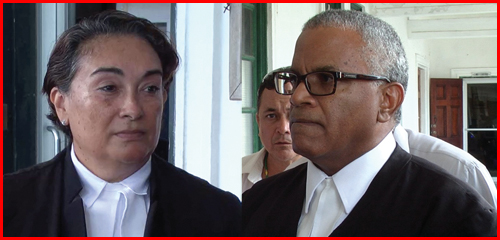 The Barrow Government has successfully legislated around the PUP’s attempts to block the ICJ referendum. They are now seeking to convince Chief Justice Kenneth Benjamin to lift the injunction he granted to the PUP, which stopped the Government from holding the referendum on April 10, 2019.
The Barrow Government has successfully legislated around the PUP’s attempts to block the ICJ referendum. They are now seeking to convince Chief Justice Kenneth Benjamin to lift the injunction he granted to the PUP, which stopped the Government from holding the referendum on April 10, 2019.
As readers will remember, nearly four weeks ago, at the beginning of April Chief Justice Benjamin granted the PUP their injunction against the Government, which forced the Barrow Administration to postpone the referendum. The PUP’s reasoning for applying for the injunction was to stop the referendum from taking place before their complaints against the 2008 Special Agreement could be resolved. They insist that the Government did not properly ratify that treaty with Guatemala by taking it to the House of Representatives and the Senate for approval.
As it turned out, the Chief Justice was convinced by Eamon Courtenay, attorney for the Opposition, on the purely technical point that the writ of referendum for April 10, 2019 may be defective. The PUP politicians beat their chest mightily when they forced the postponement, but the Barrow Government cured that issue by passing a new Belize Territorial Dispute Referendum law. A new writ of referendum has been issued by the Governor General, which sets the ICJ referendum to May 8 now.
The Opposition appears to have accepted that they can resist no further, and they’ve resorted to going to voters to convince them to vote no. But, their injunction against the April 10 referendum is still in place. The Government considers it a formality, and their lead attorney, Lisa Shoman, has applied to the Chief Justice to have that injunction lifted, since it currently has no effect.
Speaking with the press after the morning session of April 29 hearing before the judge, Shoman told reporters, “It is our position… that there is no longer any proposed referendum that can or will be held under the writs of referendum issued by the Governor General for the 10 of April. Obviously, both the request which were issued are for specific dates, and those no longer exist. You heard in court Mr. Courtenay saying they are not disputing the factual basis that we claim, which is that these writs were for a specific date, and that also, the new writs which have been issued has nothing to do with the Referendum Act, or anything that was really challenged in this claim. It’s under a new law, and so, our position is that the injunction would not in any case affect this claim. But in order to try and ensure that we have formality, what we’ve done is to apply to discharge it.”
She has reiterated that the injunction has no effect on the government’s intention to hold the ICJ referendum on May 8. Given that the PUP claimants have not disputed the facts that a new referendum was called under the new legislation, Shoman went back before the Chief Justice and withdrew the application to set aside the injunction. She told the press that she consulted with the Government, and it was decided that this injunction fight is not necessary, given that it does not stop the May 8 referendum.
The PUP were convinced they had successfully delayed the referendum indefinitely, but it turns out what they really did was to simply delay it by exactly one month. The course of Belize’s history, for the time being, is back on track where everyday Belizean voters will get to decide how Guatemala’s territorial claim over this country is resolved. That’s first in the over 100 years that this claim has existed.
Eamon Courtenay, the attorney for the PUP, has insisted to the media that the Government is at risk of having the referendum results nullified if the Special Agreement is ruled unconstitutional by the Courts of Belize. They will press their appeal in the Court of Appeal; this fight may very well end up at the Caribbean Court of Justice.
Discussing the May 8 referendum date, Courtenay told court reporters, “They can proceed with their referendum, knowing full well that it can be declared null and void.”




